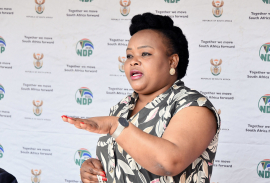
Deputy Minister in the Presidency Thembi Siweya says women leaders, influencers and thought leaders have a duty to pave the way for others to follow, as many women remain marginalised and have no voice.
In her opening remarks at the Women’s Socio-Economic Empowerment and Advancement webinar on Monday morning, Siweya commended the women of 1956 who marched to the Union Buildings in Pretoria and the many others who have paved way for a better tomorrow for all.
The event was organised by the Government Communication and Information System (GCIS) in partnership with Brand South Africa, BintiAfrika Konnect and Mail & Guardian.
“As women, we need to use our collective voices and our influence. I know all of us have faced many challenges and that despite our successes we are still burdened in additional ways merely by being women,” Siweya said.
“Our struggles have made us resilient and this same resilience can be found in millions of women on the continent,” she said.
There is a need to delve deeper into the challenges that women face and to explore solutions.
“Our task today is to use our collective wisdom to find innovative ways to empower women while also strengthening gender equality and inclusive growth across all sectors.
“The empowerment of women is an imperative but it is also the single most purposeful thing that can be done to build a nation,” Siweya said.
Women, she said, are known to invest in their children's health and education which holds enormous benefits in the fight against the triple challenge of unemployment, inequality and poverty.
“Women who are financially dependent on their husbands, fathers, partners and family members have increased vulnerability to domestic violence, rape, incest, abuse, and murder. By empowering women, we give them financial freedom to liberate themselves from abusive relationships,” the Deputy Minister said.
Also taking part in the webinar, Mmabatlharo Nono Dihemo: Senior Gender Advisor at the United Nations Assistance Mission for Afghanistan, said since the pandemic, gender inequality has deepened.
By 2021, there were fewer jobs for women compared to those of men. “As governments responded, women’s needs were rarely at the centre,” she said.
Dihemo said violence against women and girls also intensified during the pandemic. It was detrimental to women’s economic security and exacerbated existing inequalities in unpaid care work.
Victoria Rowan: Research and Media Strengthening Project Officer and Binti Afrika co-founder and Eastern/Central Africa Editor, emphasised the need to educate African girls to become informed and empowered leaders in their communities.
She said various programs providing educational support for girls and young women living in extreme poverty are essential for their socio-economic sustainability.
“Legal protection, health care, and access to training and job skills so that girls can thrive, making a difference in their lives and their communities will empower socio-economic rights to female youth,” Rowan said.
In her closing remarks, GCIS Director-General Phumla Williams said there are solutions to some of the many problems that can achieve meaningful change.
“The negative socio-economic effects from the COVID-19 pandemic also threatens to undo the many inroads we have made over the years in advancing women. If we are to stay the course, we must redouble our efforts. We must work towards the complete and equal integration of women into all aspects of our society,” Williams said.
She said investing in women is one of the most effective development tools to uplift women and children.
“Our government has since 1994 sought to advance women in our society. We have made gender equality and women’s empowerment central to our transformation agenda and it is also at the heart of our efforts to stimulate sustainable development,” Williams said. – SAnews.gov.za


